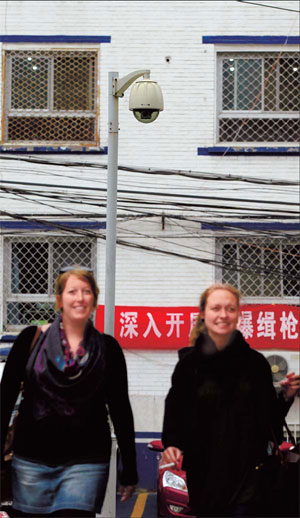Top Stories
Video security cameras zoom in on privacy issues
By Du Guodong (China Daily)
Updated: 2010-04-26 08:12
 |
Large Medium Small |
|
Two expats walk past a security camera in Sanlitun. [Wang Jing / China Daily] |
The capital's expansive drive to install surveillance cameras, which are said to be playing a major role in public security, is itself drawing watchful eyes: citizens and experts who decry the loss of privacy.
About 400,000 surveillance cameras have been installed in Beijing and 70,000 more will be added by the end of the year, the Beijing Security and Protection Industry Association (BSPIA) said.
Police say the cameras are an important tool for solving crimes. According to the Beijing municipal public security bureau, 1,972 civil and criminal cases were cracked last year, and 2,841 suspects were arrested, thanks to the omnipresent public eye.
But as surveillance cameras in public areas are becoming smaller and less detectable, critics say they fear the loss of privacy.
Du Zuoyu, a senior at the middle school affiliated with the Beijing-based China University of Geosciences, spoke to METRO about her sense of unease over the cameras.
"We have a feeling of being watched every day, and we don't know by whom and for what purpose," Du said. "No one has explained it to us, and I don't know whether it is a violation of our privacy."
The city government implemented its "administrative measures on visual information for public security" in 2007.
"It is no problem to use cameras as a scientific way of management for the public interest, but the issue is that with a growing reliance on these surveillance cameras, the regulations on the use of the images leave much to be desired," said Wang Zongyu, a law professor at Renmin University of China. "The government should promulgate laws to prevent the information from being illegally disseminated."
Another professor of law at Peking University, who did not wish to reveal her name, said the real question is the line between legal monitoring and invasion of privacy.
She veers on the side of the public's right to know.
"What the government should do is to publish more information about the distribution of cameras and their use to ease the public anxiety," she said.
The surveillance cameras have covered essentially 100 percent of the city's public places, including traffic arteries, shopping malls, hospitals and key departments of the electricity, water and heat supply systems.
More than 83 percent of residential communities are now wired to security cameras, according to the police.
A total of 1 billion yuan was earmarked for the camera system as of the end of 2009.
The cameras watch over as many as 2,000 public primary and middle schools, particularly their entrances, dining halls, dormitories and playgrounds, officials said.
"Building a security network based on a visual monitoring system has greatly enhanced the image of the capital as a world metropolis of security," Li Ping, secretary-general of the BSPIA, said during a forum on public security last week.
No single body is responsible for the management of the cameras. Different departments are responsible for the installation, maintenance, monitoring and the use of images.
"We are only taking care of the land transport service in Beijing and are not accountable for cameras in subways, railroads and airports, let alone the numerous cameras in other public places," Feng Tao, an official with the policy research center of the Beijing municipal commission of transport, said.








